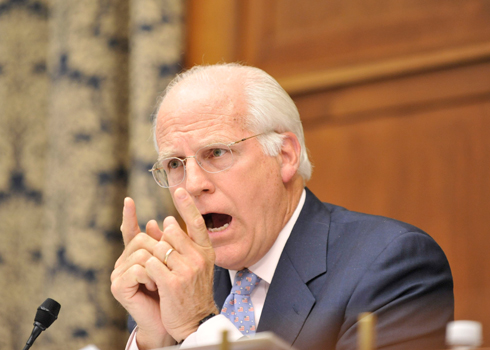The U.S. government’s dependence on private contractors for work in Afghanistan and Iraq has hampered competition and favored incumbent contractors regardless of whether they have a record of criminal or fraudulent activities, according to a new report from the Commission on Wartime Contracting.
That finding was a focus of a Commission on Wartime Contracting hearing Monday that discussed methods to exact more accountability from private contractors, including recording incumbent contractors’ performance assessments into a federal database accessible to all government agencies. Michael Thibault, the former deputy director of the Defense Contract Audit Agency, and former Rep. Chris Shays (R-CT) chair the commission.
“If you hired somebody to paint your house and they tracked paint all over your carpet, you probably wouldn’t use them again and you might even negotiate a price that was less than you originally agreed to,” said Wartime Contracting Commissioner Grant Green.
“We might just see this as free money that comes out of a Treasury pot that doesn’t really impact us so we’re not treating these contractors as we would treat a contractor at our house,” Green added.
For instance, the U.S. State Department re-hired the builders of the troubled U.S. embassy in Baghdad for a later project beset by multiple construction problems in Saudi Arabia, an example of the extensive lack of accountability for private contractors raised during the hearing.
The State Department hired First Kuwait Trading & Contracting Co. as a subcontractor to Aurora LLC for the new, $122 million U.S. consulate in Jeddah, the Red Sea port located in Saudi Arabia, but had to force the company to stop work when allegations of unsafe practices, poor labor conditions and infighting between to the two companies arose, according to a report last year by McClatchy‘s Warren Strobel.
First Kuwaiti is the same contractor that built the $736 million embassy in Baghdad well behind schedule. In 2009, the State Department’s inspector general reported that the embassy has “multiple significant construction deficiencies” and recommended that the government try to recover more than $130 million from First Kuwaiti, according to the McClatchy report.
Even though the shoddy work at the embassy was well known, First Kuwaiti didn’t make it onto a database of bad actors set up by the Project on Government Oversight, a private watchdog, because it wasn’t one of the most lucrative contractors the group is scrutinizing.
In January, the Department of Defense caused a stir when it released a report examining the extent to which the Pentagon awards contracts to companies that defrauded the government. The report found that, from 2007 to 2009, the DoD awarded nearly $270 billion in contracts to 91 companies that were found liable in civil fraud cases, and $682 million to 30 contractors convicted of criminal fraud.
It also found that companies barred from federal contracting continued to receive millions of taxpayer dollars in contracts.
“The federal government is shirking its responsibility to protect its constituents, the American public, by not vetting contractors to determine whether they are truly responsible,” testified POGO’s General Counsel Scott Armey, referring to the contracting companies with repeat offenses as “bad actors.”
The government’s Contractor Performance Assessment Reporting System is not publicly available, Armey said, and it has a well-documented history of glitches.
“In an effort to prevent contracting with the ‘usual suspects’ that have misconduct rap sheets, government officials must look for alternative, responsible vendors,” he told the Commission.
Some of the largest service contractors in Iraq and Afghanistan have checkered histories of misconduct, Armey said in his opening statement to the commission, including instances of shooting civilians, false claims against the government, violations of the Anti-Kickback Act, fraud, retaliation against workers’ complaints, and environmental violations:
According to POGO’s database:
⢠Agility has one instance which led to it being suspended from federal contracting since November 2009.
⢠Bechtel has 18 instances, including 13 environmental and labor violations.
⢠Xe/Blackwater has seven instances, four of which involve shooting incidents in Iraq and another instance primarily involving illegal weapons exports to Afghanistan ($42 million penalty).
⢠DynCorp has six instances, two of which involved alleged sex trafficking in Bosnia- Herzegovina ($173,000 judgment).
⢠Fluor has 25 instances, including three government contract fraud cases ($21.5 million in penalties), threee instances of poor contract performance ($147 million in penalties), and two instances of cost/labor mischarges ($11.7 million in penalties).
⢠G4S/Wackenhut has 21 instances, including seven involving instances of substandard conditions or brutality at its detention facilities, four instances of government contract fraud case, and four instances of poor contract performance.
⢠Halliburton has 11 instances, including three settlements of foreign bribery allegations for which it paid over $600 million in penalties.
⢠KBR has 23 instances, including six government contract fraud cases and eight guilty pleas.
Despite these repeat offenses, the Army recently awarded a lucrative logistics contract to Dyncorp, Fluor, and KBR, Armey said, even though 17 other contractors bid on the contract.
The process for suspending and prohibiting contractors with a track record of misdeeds is also riddled with problems, according to hearing testimony.
“I’ve been getting the picture that bad performance can mean good business,” said Charles Tiefer, a law professor at the University of Baltimore and a commissioner appointed by Senate Majority Leader Harry Reid (D-NV).
For instance, U.S. Navy Rear Admiral Robert Gilbeau at the Defense Contract Management Agency testified that the DoD is making strides in recording contractor misdeeds. Yet, even though he is in charge of overseeing the contractor’s work and record, he said he has no power to suspend or prohibit the U.S. government from doing work with them again.
Shays urged Gilbeau to stress the importance of oversight and changes to the system to the most senior leaders in the military. “What I have noticed [with the military] is when the senior folks want it done, it gets done,” he said.






